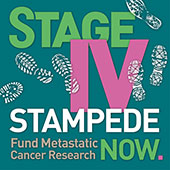

By Barry Lenk and Dan Cramer, METAvivor Advocacy Team Co-Chairs
METAvivor’s seventh annual Stage IV Stampede is fast approaching! We (the METAvivor Advocacy Team) hope you will join us in participating in this signature advocacy event. The Stampede is the best chance to promote federal support of research and financial support for people with metastatic breast cancer and other forms of metastatic cancer.
Metavivor has designated the month of October for its Stampede. Currently, the U.S. Capitol is highly restricted to visitors due to COVID, so this year’s Stampede will again be held virtually instead of in person. We hope that by next year (2023) we may have at least part of the Stampede back in person as we miss seeing everyone.
If you wish to participate, please register at https://donate.metavivor.org/StageIVStampede.
Here’s the thing to remember – no experience is required or necessary to participate in the Stampede – your story is more than enough. In fact, your story is the most valuable thing to share with our elected leaders and it’s the entire reason we organize the Stage IV Stampede each year. Our stories matter and they have an impact on our elected representatives. That’s what the Stampede is all about – contacting our federal elected officials to inform and educate them about METAvivor’s priority issues and requests.
This year, we are providing a number of resources to help prepare all Stampede participants for contacting legislators. Once you register, if your state has a State Captain, the Captain will contact you to help coordinate and to help prepare you to participate. If your state does not have a Captain, the Advocacy Committee will be back in touch with more information. Also, a recording of Metavivor’s “kickoff” training webinar, running about 30 minutes, can be found at https://youtu.be/-z6L7bQW01w. A number of other useful resources may be found on METAvivor's Stampede Web Page, which contains a number of other training webinars and other helpful resources. If you do not have any previous advocacy experience, you might find the Advocacy Toolkit especially helpful (https://www.metavivor.org/take-action/stage-iv-stampede).
Thank you for considering this invitation to participate in this year’s Stage IV Stampede. If you have any questions or concerns, feel free to contact your Advocacy Team at [email protected]. Thank you for your support and we hope to see you at one of the upcoming Stampede Trainings.

By Dane Christiansen, Managing Partner, Health and Medicine Council of Washington
Before heading into the August congressional recess, both the House and Senate advanced their respective Fiscal Year (FY) 2023 spending bills. The goal is to set up negotiations for a final spending package that may be passed at the end of the year. At this time, the bills call for significant investment in key programs and include specific metastatic cancer instructions that align with community priorities. A summary contrasting the Senate proposal with the House proposal is included below.
Congress also secured a long-awaited break through on a budget reconciliation package that includes environmental, tax, and healthcare provisions. A summary of key items is included below. The budget package can only include specific items related to collecting revenue or spending federal resources and most pending legislation does not qualify for inclusion. In order to address other important bills, there is talk of a healthcare “omnibus” package of popular and broadly-supported measures at the end of the year, which may present an opportunity for the Cancer Drug Parity Act and the Metastatic Breast Cancer Access to Care Act.
Additional advocacy will be needed, including timely outreach through the Stage IV Stampede, to ensure our funding priorities are secured for FY 2023 and that community-supported legislation is poised for passage before the current Congress adjourns.
Budget Reconciliation Package, Key Items
FY 2023 Senate Appropriations Bills, Key Items
Current Congressional Appropriations Report Recommendations
Metastatic Breast Cancer [MBC] —The Committee is aware that clinical research is of utmost importance to those living with MBC, which is breast cancer that has spread to other organs and become incurable. An estimated 168,000 Americans live with MBC, and nearly all of the more than 43,000 deaths from breast cancer are attributed to this late stage of disease. Given the mortality associated with MBC and the lack of treatment options, research offers the best possibility of therapeutic advances and extended life for these patients. MBC is also associated with startling health disparities, since breast cancer mortality is about 40 percent higher for Black women in the U.S. than Caucasian women and breast cancer is the second most common cause of death by cancer for Black women. The Committee encourages a continued emphasis by NCI on research for MBC, especially in communities of color, to discover better treatments and a cure for MBC and to address health disparities in this population. The Committee requests an update on NCI’s activities regarding MBC in the fiscal year 2024 CJ, including progress made with respect to inclusion of people of color in NCI-funded clinical trials in this area.
Metastatic Cancer Research —While the early detection and treatment of early-stage disease for many cancers results in cures, for most tumors, metastatic cancer remains incurable. More than 90 percent of cancer deaths are due to metastatic disease. In addition to genetic alterations in the cancer itself, recent research has revealed that there is a genetic basis for susceptibility to metastatic cancer or resistance to metastasis. More research is required to develop a comprehensive understanding of this complex process involving tumor and host interactions. Clinical trials are an important aspect of that progress, and diverse representation of patients in clinical trials is integral to the development of medications and therapies that effectively treat metastatic disease. Ethnicity, gender, age, and genetics all play a role in the safety and efficacy of a treatment for an individual. The Committee commends NIH and the Department of Defense (DoD) for work already underway to support research needs and opportunities identified in the April 2018 Task Force Report to Congress on Metastatic Cancer. The Committee encourages NIH to maintain collaborative efforts with DoD and the Department of Veterans’ Affairs (VA) to provide subject matter expertise, as appropriate, as DoD provides updates and continues to implement recommendations from the report aimed at achieving representation of the demographic of the U.S. population in clinical trials.
Surveillance, Epidemiology, and End Results [SEER] Registry — The Committee encourages NCI to continue to advance efforts to modernize the SEER Registry and to better capture key data points, such as metastatic recurrence and cancer migration. The Committee requests an update in the fiscal year 2024 CJ regarding NCI’s plans to update SEER, including anticipated funding for the current SEER contract.
Peer-Reviewed Cancer Research Programs —The Committee recommends $130,000,000 for the peer-reviewed breast cancer research program, $75,000,000 for the peer-reviewed prostate cancer research program, $40,000,000 for a peer-reviewed melanoma research program, $15,000,000 for the peer-reviewed ovarian cancer research program, $17,500,000 for a peer-reviewed rare cancers research program, and $130,000,000 for the peer-reviewed cancer research program that would research cancers not addressed in the aforementioned programs currently executed by the Department of Defense. The funds provided in the peer-reviewed cancer research program are directed to be used to conduct research in the following areas: bladder cancer; blood cancers; brain cancer; endometrial cancer; esophageal cancer; colorectal cancer; kidney cancer; liver cancer; lung cancer; lymphoma; mesothelioma; metastatic cancer; myeloma; neuroblastoma; pancreatic cancer; pediatric brain tumors; pediatric, adolescent, and young adult cancers; stomach cancer; and Von Hippel-Lindau syndrome. The funds provided under the peer-reviewed cancer research program shall be used only for the purposes listed above. The Committee directs the Assistant Secretary of Defense (Health Affairs) to provide a report not later than 18 months after the enactment of this act to the congressional defense committees on the status of the peer-reviewed cancer research program. For each research area, the report should include the funding amount awarded, the progress of the research, and the relevance of the research to servicemembers.
Please join METAvivor’s national network of volunteer advocates and lend your voice to community outreach and awareness efforts on Capitol Hill. We offer several training and assistance opportunities, along with State Captains who can support your efforts. Personal outreach and building relationships with your legislators are critical to advancing the community’s funding and coverage and access priorities on an annual basis.
To register for the upcoming Stampede, go to https://donate.metavivor.org/StageIVStampede. If you have any questions or desire further information, email [email protected].
By Dan Cramer, METAvivor Advocacy Team Co-Chair
One of the things that I have learned as a caregiver to my wife Cassie who has MBC is the importance of asking for help. So as one of the Co-chair of Metavivor’s Advocacy Committee let me just say: “We need your help.”
One of the priorities for Metavivor’s advocacy program is the recruiting of more state Captains and Co-Captains. One of the most effective ways to encourage people to volunteer is to personally invite them. Included at the bottom of this article are two sample template letters. The first is from a State Captain with MBC, and the second is from a State Captain who is a family member or friend of somebody with MBC. The letters also invite people to register for the Stage IV Stampede.
Please take a moment to read these letters and think about to whom you might send them. Feel free to edit or change it to personalize it. Personal relationships are the most effective way to motivate people to become involved. It would be great if you or others you know could send either or both of these letters to your networks. That would be a great help as we try to both fill gaps and increase our advocacy impact.
Thank you, and if you have any questions, feel free to contact your Advocacy Team at [email protected]. Thank you for your support.
Resources:
Sample Letters to Friends & Family 2022 (Download)

|
Pinktober – The Cruelest Month By Linda Hansen According to poet T. S. Eliot, “April is the cruelest month.” I disagree. From my vantage point, the cruelest month is October, or “Pinktober” to the breast cancer community. That’s when the country turns its focus to breast cancer awareness, and pink ribbons sprout like weeds. |
 |